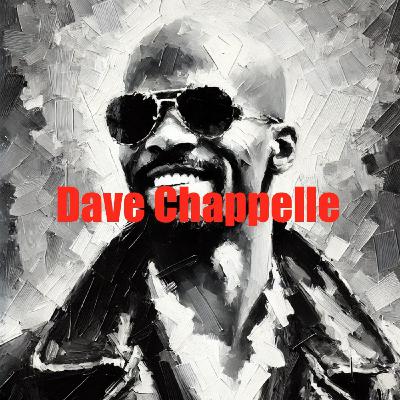Chappelle's Saudi Scandal: Comedians Clash Over Censorship and Cash
Update: 2025-10-01
Description
Dave Chappelle BioSnap a weekly updated Biography.
Dave Chappelle has been at the center of international controversy in the past week following his participation in the Saudi government’s high-profile Riyadh Comedy Festival, drawing sharp criticism from fellow comedians and human rights groups. Chappelle, along with Bill Burr, Louis C.K., and other comedy A-listers like Kevin Hart and Pete Davidson, accepted invitations to perform at what organizers branded “the world’s largest comedy festival,” with reports from TIME and others indicating paydays ranging from $350,000 to $1.6 million per act. This festival was billed as part of Saudi Arabia’s “Vision 2030” campaign, aiming to promote culture and entertainment even as the kingdom faces ongoing accusations of brutally repressing speech and violating human rights, particularly around the seventh anniversary of journalist Jamal Khashoggi’s murder.
The backlash has been swift and loud, with David Cross publicly condemning Chappelle by name in an open letter and across his social media, stating that any comedian willing to perform for what he describes as “the most oppressive regime on earth” can no longer claim credibility on matters of social justice or free speech. Cross accused the festival lineup of hypocrisy, saying that by agreeing to censorship contracts barring criticism of the Saudi regime or any religion, they have forfeited their right to complain about cancel culture at home. Marc Maron and Shane Gillis have also used stand-up routines and podcasts to lampoon those who took payment to appear, with Maron’s jokes about “two weeks of laughter in the desert” and Gillis confirming he turned down a lucrative offer from the Saudis.
On social media, the controversy has trended as comedians like Atsuko Okatsuka and Zach Woods post screenshots of the festival’s restrictive content clauses or join debates about complicity and artistic freedom. Even Tim Dillon, who claims he was dropped from the event for poking fun at forced labor, broadcast details of his original six-figure offer. In the face of mounting outcry, the headlines have been overwhelmingly critical, with TIME calling it a divisive moment for comedy and KSBY reporting that the comedians’ silence on Saudi state abuses is especially conspicuous given the timing and scale of the festival.
Chappelle himself has not commented publicly on the criticism. No recent business deals or new shows outside of the festival have surfaced, and his last major public appearance was this Saudi booking, now cast as a touchstone in debates about artistic integrity and the boundaries of free speech. This episode could mark a pivotal point in Dave Chappelle’s career not just for its controversy, but for the questions it raises among peers and fans about the cost of comedy on the global stage.
Get the best deals https://amzn.to/3ODvOta
This content was created in partnership and with the help of Artificial Intelligence AI
Dave Chappelle has been at the center of international controversy in the past week following his participation in the Saudi government’s high-profile Riyadh Comedy Festival, drawing sharp criticism from fellow comedians and human rights groups. Chappelle, along with Bill Burr, Louis C.K., and other comedy A-listers like Kevin Hart and Pete Davidson, accepted invitations to perform at what organizers branded “the world’s largest comedy festival,” with reports from TIME and others indicating paydays ranging from $350,000 to $1.6 million per act. This festival was billed as part of Saudi Arabia’s “Vision 2030” campaign, aiming to promote culture and entertainment even as the kingdom faces ongoing accusations of brutally repressing speech and violating human rights, particularly around the seventh anniversary of journalist Jamal Khashoggi’s murder.
The backlash has been swift and loud, with David Cross publicly condemning Chappelle by name in an open letter and across his social media, stating that any comedian willing to perform for what he describes as “the most oppressive regime on earth” can no longer claim credibility on matters of social justice or free speech. Cross accused the festival lineup of hypocrisy, saying that by agreeing to censorship contracts barring criticism of the Saudi regime or any religion, they have forfeited their right to complain about cancel culture at home. Marc Maron and Shane Gillis have also used stand-up routines and podcasts to lampoon those who took payment to appear, with Maron’s jokes about “two weeks of laughter in the desert” and Gillis confirming he turned down a lucrative offer from the Saudis.
On social media, the controversy has trended as comedians like Atsuko Okatsuka and Zach Woods post screenshots of the festival’s restrictive content clauses or join debates about complicity and artistic freedom. Even Tim Dillon, who claims he was dropped from the event for poking fun at forced labor, broadcast details of his original six-figure offer. In the face of mounting outcry, the headlines have been overwhelmingly critical, with TIME calling it a divisive moment for comedy and KSBY reporting that the comedians’ silence on Saudi state abuses is especially conspicuous given the timing and scale of the festival.
Chappelle himself has not commented publicly on the criticism. No recent business deals or new shows outside of the festival have surfaced, and his last major public appearance was this Saudi booking, now cast as a touchstone in debates about artistic integrity and the boundaries of free speech. This episode could mark a pivotal point in Dave Chappelle’s career not just for its controversy, but for the questions it raises among peers and fans about the cost of comedy on the global stage.
Get the best deals https://amzn.to/3ODvOta
This content was created in partnership and with the help of Artificial Intelligence AI
Comments
In Channel





